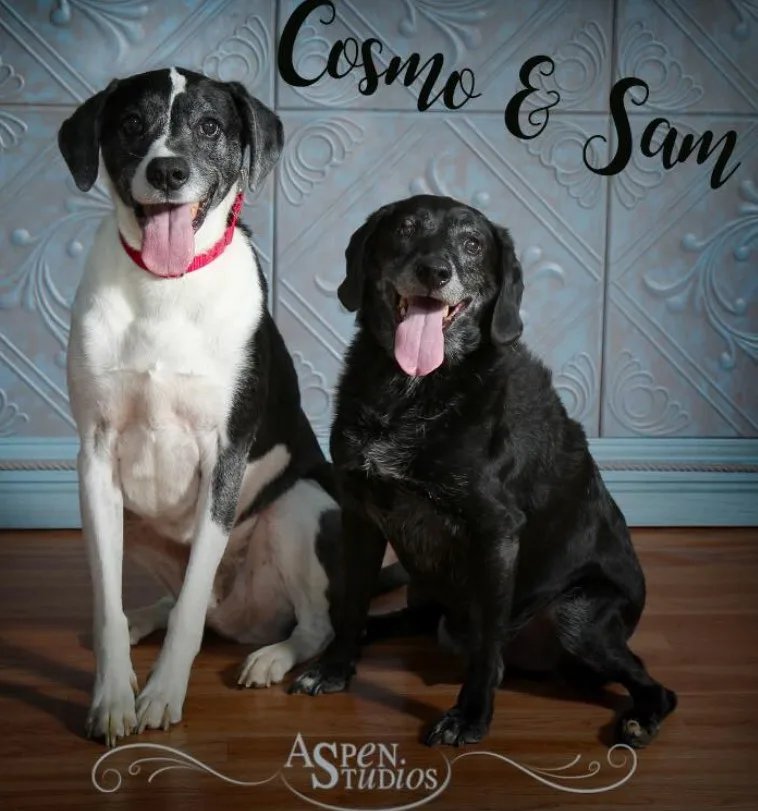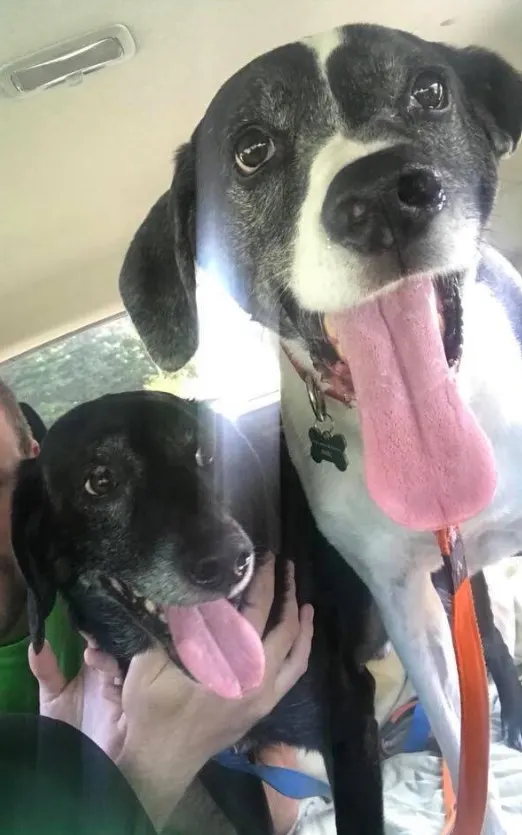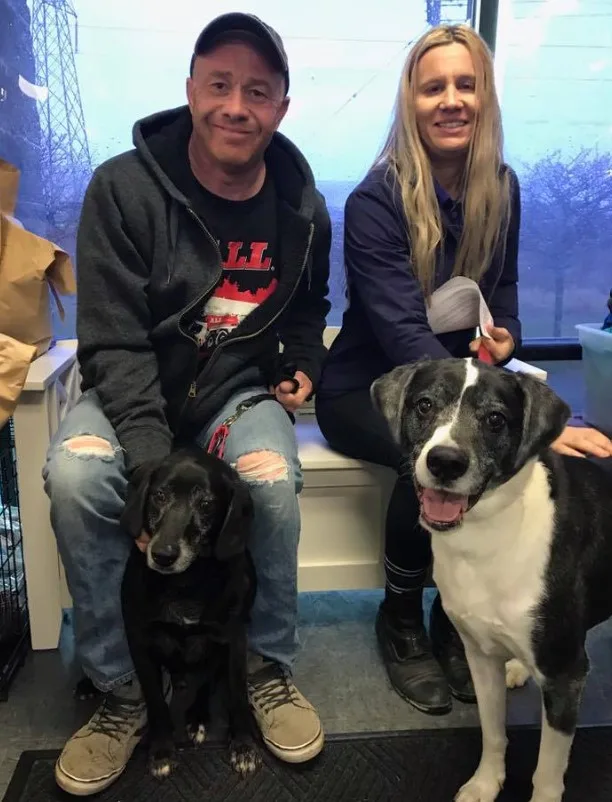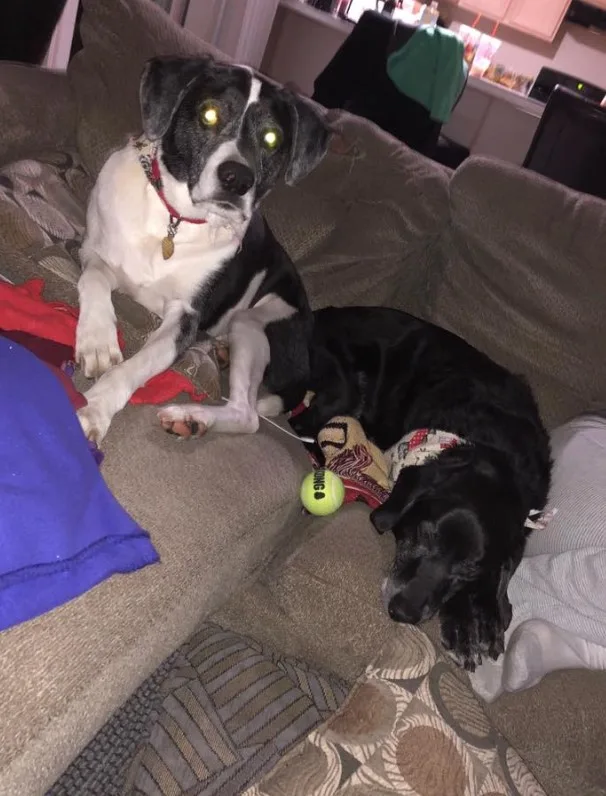Many people consider their dogs to be family members, but not all of them appear to think that way.
Abandoning your pet is cruel, but having your two dogs (very happy and healthy dogs) euthanized because of a mere inconvenience is a whole new level of cruelty.
They Lived With Him For 10 Years

In June 2018, a man from Indiana, USA, brought his two dogs (Cosmo and Sam) to his local vet clinic and asked to have them euthanized.
Cosmo was a small Labrador Retriever mix and Sam was a Pointer, and they were a bonded pair of senior dogs.
The two dogs were very sweet, happy, and healthy, and they had lived with their owner for almost 10 years prior to this horrible situation.
Their owner wanted to have them euthanized because he was moving in with his girlfriend, who was allergic to dogs, and they did not consider them to be a necessary part of their life anymore, according to the rescue.
So, instead of finding a way or even going to a shelter and surrendering the dogs, he thought “convenience euthanasia” was the right solution.
Convenience euthanasia refers to requests to end the life of an animal because they no longer fit into the owner’s lifestyle. [1]

Thankfully, the vet refused to euthanize Cosmo and Sam because they were perfectly healthy and did not deserve to die like that. “None of us want to end a pet’s life unless it is to prevent suffering,” the vet said.
The two dogs were sent to Begin Again Rescue Co (BARC), a foster-based and non-profit dog rescue located in Valparaiso, Indiana.
Cosmo And Sam Found Their Forever Home

It took some time for Cosmo and Sam to get over the heartbreak of being abandoned, but with the help of the wonderful volunteers at BARC, they started to eat again, play, and be themselves.
However, finding a forever home for a bonded pair of senior dogs wasn’t easy, although they still had a lot of life left in them.
After a couple of months of not finding a home, Cosmo and Sam went to P.A.W.S. Tinley Park, a no-kill animal shelter in Illinois, USA, that offered to help.
It usually takes a lot longer for senior dogs to get adopted, but thankfully, Cosmo and Sam did find a home in the beginning of December 2018.
They were adopted by Eric and Tiffany Dybas, a couple that had recently lost their beloved dog and had fallen in love with Cosmo and Sam when they heard their story.

“Thanks to our friends at P.A.W.S. Tinley Park, Sam and Cosmo are laying on a comfy couch tonight! They were so good when they visited Santa and now their Christmas wish has come true! They have a home!,” said in the Facebook post by BARC.
According to the shelter, the two beautiful boys are very happy at their new home, being spoiled and loved to the fullest.
References:
[1] Cooney, K. A., & Kipperman, B. (2023). Ethical and Practical Considerations Associated with Companion Animal Euthanasia. Animals, 13(3), 430. DOI
Ever caught your furry friend in the act of munching on something less than appetizing? It’s not uncommon for dogs to engage in some rather peculiar dining habits, one of the most baffling being their tendency to chow down on their own poop. As a seasoned dog trainer, you’ve likely encountered this behavior more than once and found yourself wondering about the reasons behind it.
While it may seem utterly repulsive to us, this habit, known as coprophagia, can leave many dog owners scratching their heads in confusion. Despite our best efforts to prevent it, some dogs just can’t resist the allure of a fecal feast. Understanding the motivations behind this behavior is key to addressing it effectively and ensuring your canine companion stays happy and healthy.
Understanding Coprophagia in Dogs
The Basics of the Behavior
When it comes to dogs eating their own feces, known as coprophagia, it’s a common yet puzzling behavior that can leave dog owners scratching their heads. So, why do dogs engage in this unsavory habit? Well, there are a few reasons why your furry friend might be doing this.
Health Implications for Your Canine
Let’s talk about the health implications for your beloved pet. While coprophagia itself might not always be harmful, it can sometimes lead to health issues if not addressed. Keep an eye on your dog’s behavior and consult with a vet if you have concerns about this habit impacting their health.
Common Reasons Dogs Eat Their Own Poop
Nutritional Deficiencies
Dogs may eat their own poop due to nutritional deficiencies. If your dog’s diet lacks essential nutrients, they might resort to eating feces to try to fulfill those missing elements. To address this, ensure that your dog is receiving a balanced diet containing all the necessary vitamins and minerals.
Boredom or Anxiety
Boredom or anxiety can also lead dogs to eat their feces. When dogs are bored or anxious, they may exhibit destructive behaviors, including coprophagia. Providing mental stimulation through interactive toys, regular exercise, and spending quality time with your dog can help alleviate boredom and reduce the urge to eat poop.
Coping With Environmental Stressors
Environmental stressors, such as changes in routine, loud noises, or being left alone for extended periods, can trigger coprophagia in dogs. It’s essential to create a calm and stable environment for your furry companion. Developing a consistent daily routine, offering safe spaces during noisy events, and ensuring your dog feels secure can help them cope better with environmental stressors.
Puppy Mimicking or Exploration
Puppies may eat their own poop as a form of mimicking their mother cleaning them or out of curiosity during the exploration stage. This behavior usually diminishes as they grow older and learn proper behaviors from their human and canine family members. Supervising puppies closely during potty training and redirecting their attention to suitable toys can discourage coprophagia.
Understanding the common reasons behind why dogs eat their own poop is crucial for effectively addressing this habit. By addressing nutritional deficiencies, alleviating boredom and anxiety, managing environmental stressors, and guiding puppies during their exploration phase, you can help prevent coprophagia in your canine companion. Remember, consulting with a veterinarian for personalized advice and guidance is always advisable.
Health Concerns and Risks
Parasites and Diseases
When dogs consume their feces, they expose themselves to various parasites and diseases. These health risks can include worms, parvovirus, and other contagious infections. Parasites like roundworms and hookworms can be transmitted through fecal matter, leading to serious health issues if ingested.
Digestive System Complications
Eating feces can disturb a dog’s digestive system. The introduction of bacteria and toxins from feces back into their body can disrupt the balance of their gut flora, potentially causing gastrointestinal problems. This behavior may result in vomiting, diarrhea, and other digestive complications that can impact the overall well-being of your furry companion.
How to Discourage Coprophagia
Training and Behavior Modification
To discourage coprophagia, start by teaching your dog the “Leave It” and “Drop It” commands. Use positive reinforcement techniques like treats and praise when your dog obeys these commands. Supervise your dog closely when outside to prevent them from eating feces. Redirect their attention to toys or activities they enjoy when you catch them trying to eat poop.
Dietary Adjustments and Supplements
Ensure your dog is fed a high-quality, balanced diet to meet all their nutritional needs. If necessary, consult your vet about adding supplements to their diet to address any deficiencies that might be causing them to eat feces. Some supplements can help improve digestion and make the feces less appealing to your dog.
Environmental Enrichment
Provide plenty of physical exercise and mental stimulation for your dog to prevent boredom, which can lead to coprophagia. Interactive toys, regular walks, and playtime can keep your dog mentally and physically active. Creating a stimulating environment with toys, puzzles, and social interactions can reduce stress and anxiety, decreasing the likelihood of your dog eating poop.
Remember, consistency and patience are key when trying to discourage coprophagia. Consult with your vet if the behavior persists to rule out any underlying health issues or to seek further guidance on behavior modification strategies.
When to Consult a Veterinarian
Persistent Coprophagia
If your dog continues to engage in coprophagia despite your efforts to deter this behavior through training and environmental changes, it’s time to consult a veterinarian. Persistent coprophagia may indicate underlying health issues that need professional evaluation. Your vet can conduct a thorough examination to rule out medical conditions that could be causing this behavior.
Signs of Underlying Health Issues
Keep an eye out for any unusual signs or symptoms in your dog that accompany coprophagia. Weight loss, changes in appetite, lethargy, diarrhea, or vomiting could be indicators of an underlying health issue contributing to your dog’s feces-eating behavior. If you notice any of these signs, it’s crucial to seek veterinary advice promptly to address potential health concerns and ensure your dog’s well-being.
Conclusion
Understanding why your dog eats its own poop is crucial for their well-being. From nutritional deficiencies to boredom and anxiety, various factors can contribute to this behavior. It’s essential to address coprophagia promptly to prevent health risks like parasites and diseases. By implementing training techniques, adjusting their diet, and enriching their environment, you can discourage this habit. Remember, if coprophagia persists, consulting a vet is vital to rule out any underlying health issues. Watch out for signs like weight loss, changes in appetite, lethargy, diarrhea, or vomiting, as they may indicate a more serious problem. Stay consistent, be patient, and seek professional advice to effectively manage and prevent coprophagia in your furry friend.
Frequently Asked Questions
What is coprophagia in dogs?
Coprophagia is the behavior where dogs consume their feces or that of other animals. This can be caused by various factors like nutritional deficiencies, boredom, anxiety, or stress.
What are the health risks associated with coprophagia?
Health risks related to coprophagia include potential exposure to parasites and diseases, which can be harmful to the dog’s well-being.
How can I prevent or discourage coprophagia in my dog?
To discourage coprophagia, consider training your dog with commands like “Leave It,” adjust their diet to address any nutritional deficiencies, and provide ample environmental enrichment and mental stimulation.
When should I consult a vet about my dog’s coprophagia behavior?
If your dog’s coprophagia behavior persists despite trying preventive measures, consult a vet as it may indicate underlying health issues. Look out for signs like weight loss, changes in appetite, lethargy, diarrhea, or vomiting, which warrant prompt veterinary attention.
[no_toc]

Hey there, I’m Janet Brooks, a dog-loving student from California. I’m all about helping pups in need, especially those without homes. Me and my awesome friends work together to give shelter and love to stray dogs. Oh, and I also write blogs about dogs to share helpful info.